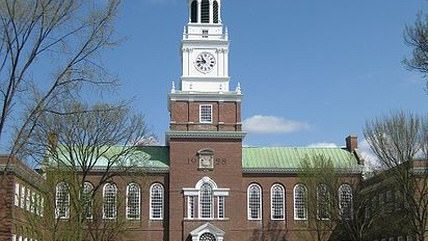Just Say No to College
Thiel Fellowship winner Paul Gu skipped higher education to develop a new means of financing higher education.

Paul Gu is the winner of a Thiel Fellowship-a two-year $100,000 grant designed to encourage teenagers to skip college and pursue scientific or entrepreneurial projects in the real world. He is also the founder of Upstart, a human capital contract firm that allows investors to fund an individual's education in exchange for a share of their future earnings. Gu spoke with reason intern Michael Bruschini in August about his experience with the Thiel fellowship, his start-up, and the future of higher education.
Q: You came here from China at six without any knowledge of English. How did you climb the ladder to attend Yale and become a Thiel Fellow?
A: I developed a streak for independent thinking early on and generally preferred to try beating the system instead of doing what I was told. I loved my time at Yale, but after two years, it was obvious to me that I was more of a self-learner and was getting impatient to get in the "real world." So when I saw the Thiel opportunity come along, it was a no-brainer for me.
Q: Why did you decide to start Upstart?
A: With a bit of a quant-finance/economics background, I was naturally curious about problems with risk management. After some thinking, I realized that [financial] asset class diversification was overlooking the single largest financial risk anyone faces-their own career!
Q: What kind of impact do you think Upstart could have on the student loan system and alternative education financing?
A: One big concern with the student loan industry is that it is future-income agnostic. The extreme example is the person who takes out $200,000 in loans and majors in a subject not in high demand by the job market. From a purely economic perspective, you probably have many people who are paying too much and not getting enough out of their educations. Income sharing contracts could completely change the incentives. Upstarts are able to raise more capital if their projected income is higher, and their backers have a strong incentive to help them succeed. Schools and the student industry today don't do that.
Q: How do you plan to make your programs more attractive than the federal student loan programs?
A: With enough subsidization, federal student loans will be cheaper than anything the private sector can offer. That said, there is a limit to subsidized loans, and many students borrow from private lenders too. The fundamental advantage of Upstart is that it is less risky and more flexible for the borrower than any kind of debt.
Q: Some will say it sounds like indentured servitude. How do you respond?
A: Investors don't get to decide what upstarts do. Beyond that, the essence of indentured servitude is the loss of freedom to make important life choices. Upstart aims to do the very opposite. Unlike debt, which forces people to follow certain career paths and lifestyles in order to make fixed monthly payments, Upstart payments are inherently flexible and easy. With capital from Upstart and the non-distortionary income-based payments, upstarts have a much greater ability to make the best choices for their life.
Q: Will there be a high rate of return for investors?
A: The important thing to remember is that investing in individual incomes is much lower risk than investing in companies-especially early-stage-because individuals find new jobs when companies fail.


Show Comments (121)